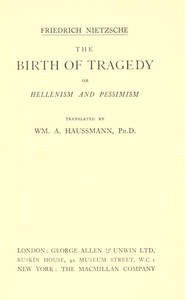The Birth of Tragedy; or, Hellenism and Pessimism by Friedrich Wilhelm Nietzsche
"The Birth of Tragedy; or, Hellenism and Pessimism" by Friedrich Wilhelm Nietzsche is a philosophical work written in the early 19th century. This foundational text explores the origins of Greek tragedy, emphasizing the interplay between the Apollonian and Dionysian elements of art and existence. Nietzsche presents a duality where the rational and structured aspects of Apollo contrast sharply with the chaotic, passionate nature of Dionysus, ultimately arguing that both forces are essential
to the human experience and the creation of art. The opening of this work provides a deep insight into Nietzsche's philosophical explorations surrounding the nature of existence and art. He reflects on experiences from his youth and the foundational influences of Hellenism, Schopenhauer, and Wagner upon his thinking. Nietzsche begins to articulate the essential conflict between the beauty represented by Apollo and the primal chaos embodied by Dionysus, suggesting that Greek tragedy arose from a reconciliation of these contrasting forces. Through this lens, he begins to question the notion of pessimism and its relationship with artistic creation, hinting at a complex relationship between joy, suffering, and the necessity of art for human life. The prologue sets the stage for the intricate analysis of Greek aesthetics that follows, inviting readers to consider the deeper implications of tragedy as a reflection of life's dualities. (This is an automatically generated summary.)
Read now or download (free!)
| Choose how to read this book | Url | Size | ||||
|---|---|---|---|---|---|---|
| Read online (web) | https://www.gutenberg.org/ebooks/51356.html.images | 376 kB | ||||
| EPUB3 (E-readers incl. Send-to-Kindle) | https://www.gutenberg.org/ebooks/51356.epub3.images | 212 kB | ||||
| EPUB (older E-readers) | https://www.gutenberg.org/ebooks/51356.epub.images | 217 kB | ||||
| EPUB (no images, older E-readers) | https://www.gutenberg.org/ebooks/51356.epub.noimages | 180 kB | ||||
| Kindle | https://www.gutenberg.org/ebooks/51356.kf8.images | 317 kB | ||||
| older Kindles | https://www.gutenberg.org/ebooks/51356.kindle.images | 287 kB | ||||
| Plain Text UTF-8 | https://www.gutenberg.org/ebooks/51356.txt.utf-8 | 345 kB | ||||
| Download HTML (zip) | https://www.gutenberg.org/cache/epub/51356/pg51356-h.zip | 195 kB | ||||
| There may be more files related to this item. | ||||||
Similar Books
About this eBook
| Author | Nietzsche, Friedrich Wilhelm, 1844-1900 |
|---|---|
| Editor | Levy, Oscar, 1867-1946 |
| Translator | Haussmann, William A. |
| Uniform Title | Die Geburt der Tragödie. English |
| Title | The Birth of Tragedy; or, Hellenism and Pessimism |
| Note | Reading ease score: 41.4 (College-level). Difficult to read. |
| Note | Wikipedia page about this book: https://en.wikipedia.org/wiki/The_Birth_of_Tragedy |
| Credits | Produced by Marc D'Hooghe (Images generously made available by the Hathi Trust.) |
| Language | English |
| LoC Class | B: Philosophy, Psychology, Religion |
| Subject | Aesthetics |
| Subject | Music -- Philosophy and aesthetics |
| Subject | Tragedy |
| Subject | Greek drama (Tragedy) -- History and criticism -- Theory, etc. |
| Subject | Mythology, Greek, in literature |
| Subject | Tragic, The |
| Category | Text |
| EBook-No. | 51356 |
| Release Date | Mar 4, 2016 |
| Most Recently Updated | May 5, 2024 |
| Copyright Status | Public domain in the USA. |
| Downloads | 5730 downloads in the last 30 days. |
| Project Gutenberg eBooks are always free! | |

